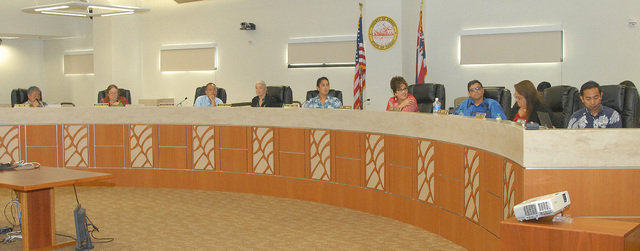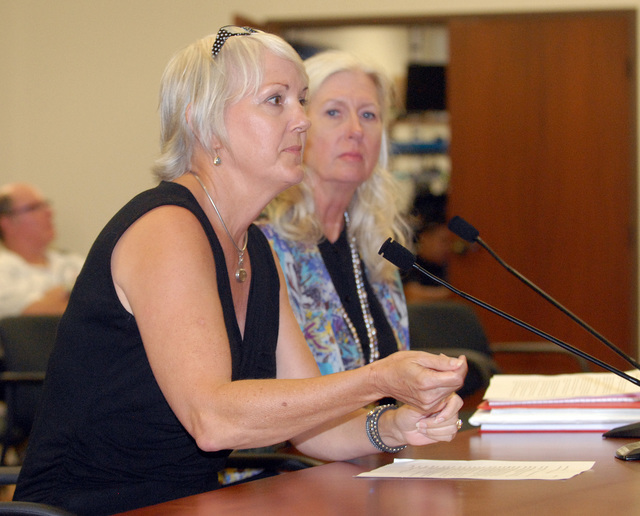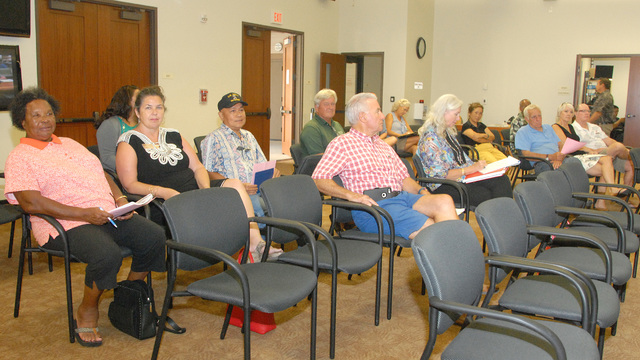HILO/KAILUA-KONA — More than two dozen people showed up Tuesday evening to speak their minds on a proposed one-half percent general excise tax increase, with all but one opposed to the idea. ADVERTISING HILO/KAILUA-KONA — More than two dozen people
HILO/KAILUA-KONA — More than two dozen people showed up Tuesday evening to speak their minds on a proposed one-half percent general excise tax increase, with all but one opposed to the idea.
The group of opponents, ranging from Realtors to small business owners to business groups and advocates for the elderly and the poor, said the tax hike could do more harm than good. Testifiers showed up at all the videoconference sites in addition to the West Hawaii Civic Center, where the meeting was held.
The Kona-Kohala Chamber of Commerce came out against the measure. One of the main concerns, said Executive Director Kirstin Kahaloa, is the chamber’s “buy local” promotions could be undermined by people making Internet purchases where the tax doesn’t apply.
“There is a concern it could price local businesses out of the market,” Kahaloa said.
The sole proponent characterized the tax hike as a fair way for everyone to shoulder the load.
“I think it’s a fair tax that will be a tax for everybody across the board,” said Frank Commendador, a small business owner testifying from Hilo. “It’s a more consistent source of revenue as our county expands.”
Bill 165 is straightforward: “There is hereby established a one-half percent general excise and use tax surcharge to be used for purposes of funding the operating and capital costs of public transportation within the County of Hawaii as specified herein. The excise and use tax surcharge shall be levied beginning Jan. 1, 2018.”
That means, should the bill pass the council and be approved by the mayor, the public would have no further opportunity for input, and the ordinance would automatically go into effect Jan. 1, 2018.
The council Finance Committee is scheduled to take up the measure again on May 3.
Those opposed to the tax say the tax is regressive, hurting poor people more than the well-off. Opponents said the county should seek out more of the transient accommodations tax from the state, remove loopholes in the county property tax system and cut spending rather than institute a new tax.
“It will have a negative impact on the entire community and especially those who can least afford it,” said Rick Vidgen, a Realtor testifying from Kona. “Fix the property tax system and the financial issue will disappear.”
Marlene Hapai, representing the Hawaii Island Portuguese Chamber of Commerce, said the county can avoid the tax by increasing public-private partnerships and providing more opportunities for nonprofits to provide some of the services currently being provided by the government.
Hapai said her group opposes the tax because increasing the tax could result in the county having to provide more services for those currently living paycheck-to-paycheck.
“This move would lead to an increase in services (the county) could not afford,” Hapai said.
David Bateman, representing Realtors and the Kona coffee industry, said the tax hike will backfire and make it more difficult to attract investment into the county. The GET increase could be “the straw that breaks the camel’s back,” he said.
“We’re trying to move industry into this county, we’re trying to attract new industry, we’re trying to attract buyers,” Bateman said.
Stephanie Donoho, administrative director of the Kohala Coast Resort Association, said “we’re going to tax ourselves out of competition, if we tax the visitor industry as well.”
The GET surcharge would bring an estimated $25-$35 million more annually to Hawaii County.
The current general excise tax is 4.166 percent. The tax hike would take that to 4.666 percent. Mayor Billy Kenoi recently encouraged the council to approve it.
The added tax must be used for transportation projects, under the authority the state Legislature and Gov. David Ige gave the counties last year. The County Council must have a bill passed and signed by the mayor before July 1, or the ability to enact the tax expires.





